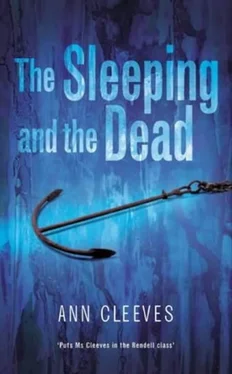‘Perhaps that’s how he met Theo Randle,’ Porteous said, almost to himself.
‘Perhaps that’s still how he gets to meet young lads.’
‘Had the local bobbies heard that anything like that’s going on?’
‘They didn’t say.’ Stout sounded disappointed. ‘But he’s known as a loner. Well thought of in the village, but no real friends, no wife, no ladyfriend.’
You could say the same about me, Porteous thought.
‘Did the neighbours have any idea where Reeves had gone?’ he asked.
‘Away for a week to visit an old colleague. They think he’ll be back today or tomorrow.’
‘I don’t suppose they mentioned where the old colleague lives?’
‘No. The old lady who lives next door asked but he wouldn’t say. It wasn’t like him. Usually he was happy to have a cup of tea with her and a chat.’
‘Suspicious…’ Porteous said, but only to please Stout. He didn’t want Reeves to be uncovered as a child-abuser and serial killer. His employment at Redwood would be seized upon by the press. Alice Cornish would lose her credibility. And it would mean that Stout had been right all along. He hated to admit it but an element of competition had crept into the inquiry. Stout had found an address for Reeves, but still Porteous hadn’t discovered where Crispin Randle had taken Theo to be educated after the fire. He didn’t want Stout to be proved right about this.
‘I’ve made an appointment to visit Mr and Mrs Gillespie,’ he said. It would be the first formal interview with Melanie’s parents. According to Richard Gillespie the doctor had said Eleanor wasn’t up to it before. Gillespie still wasn’t keen but Porteous had persisted and he’d reluctantly given way. He must have realized it would have to happen eventually. ‘One o’clock. Is that all right with you?’
‘You want me to come?’
‘I don’t want to miss anything. And while we’re at the coast I thought we’d see Melanie’s friends. Rosalind Morton and the boyfriend. You’re good at teenagers.’ He’d thought Stout would be pleased to be asked. ‘Don’t worry. They’ll let us know if there’s any news on Reeves.’
When Stout left the office Porteous made his decaffeinated coffee and spent most of the next hour on the phone. His first call was to an official in the Department for Education. He needed to find out where a child had been at school thirty years ago. It was urgent. A murder inquiry. Was there any way of finding out? There was a moment of silence and Porteous sensed the usual shock and excitement.
‘State sector or private?’
‘Private.’
Another silence. Then: ‘Did he take any public examinations?’
‘O levels. He must have taken O levels because he went on to the sixth form.’
‘You could try the exam boards then.’ The official hesitated then offered tentatively: ‘If you don’t mind giving me the details I can phone round for you. Call you back later.’
Porteous didn’t mind. He gave both Theo Randle’s names and his date of birth. ‘We think he was in school somewhere in Yorkshire.’
He replaced the receiver and felt he was easing back into contention in the race with Eddie Stout. Then he remembered two kids had died and wondered how he could have been so petty.
The next phone call was to Hannah Morton’s house. It was answered sulkily by a girl who sounded as if she’d just woken up. If anything when he identified himself she was even ruder. ‘Don’t come to the house,’ she said. ‘I’ll be working. The Promenade. A big white pub on the front. You’ll need to talk to Frank anyway and I’ll make sure Joe’s there. Make it mid-afternoon when we’re not so busy.’ She replaced the receiver before he had a chance to object.
He was wondering whether to break his routine and have another cup of coffee when the DFEE officer phoned him back.
‘I think I’ve traced your lad.’
‘Go on.’
‘He took O levels in the name of Michael Grey. Passed seven well. A grades in Art and English. Failed Latin.’
That’s all it took, Porteous thought. One phone call. Why didn’t I think about the exam boards before?
‘Have you got the name of the school?’
‘Marwood Grange. It doesn’t exist any more. I checked.’
‘Where was it, when it did exist?’
‘Out in the sticks. Yorkshire.’ He paused. He was good at dramatic pauses. ‘I tracked down one of the teachers. He works in the state system now. You can phone him if you like. Name of Hillier. This is his number.’ Porteous was just about to replace the receiver, when he added, ‘By the way. There’s no record of A levels.’
‘No,’ Porteous said. ‘There wouldn’t be.’
Hillier must have been waiting for his call because he answered immediately. ‘Marwood Grange,’ he said. ‘What a nightmare. It put me off private education for life.’
‘Do you remember Michael Grey?’
‘No. I was only there for a couple of terms before the place closed down and that was a bit of a blur. Like I said. A nightmare.’
‘Why did it close?’
‘Well, the fire was the final straw, but I don’t think it would have survived long anyway. A couple of parents had complained and several more had taken their kids away.’
‘Tell me about the fire.’
‘It started late one night. I was junior housemaster. It started in a classroom they think, but it spread to the dormitories. We got all the boys out but only because a kid got up for a pee. There were no fire doors. No extinguishers. There should have been a court case. It was gross negligence. I’d have been a witness… The guy in charge must have had friends in high places because it never came to that. He cut his losses, claimed the insurance and agreed not to run a school again.’
‘You’re sure you don’t remember a boy called Michael Grey?’
‘Certainly. I really only remember the boys in my house.’
Porteous saw Stout hovering outside his office door, ready for his trip to the coast, and waved him in. Another fire, he thought. Can that be a coincidence?
The Gillespie house had the dense quiet of an old church. It struck Porteous so strongly because he could tell that usually it wouldn’t have been like that. As they approached the front door he saw through the living-room window an electric guitar and a practice amp, a battered upright piano with music on the stand and scribbled manuscript in a pile on the floor. In the hall the telephone had been unplugged.
Richard Gillespie let them in and took them to a room on the first floor which he called his office. It had a desk and a computer but it was big enough for a leather sofa and a couple of armchairs. He left them there while he went to fetch coffee. The room was at the back of the house and looked over the garden to public tennis courts. Two women were playing a scrappy if energetic game and occasionally shouts of triumph and cries of ‘well done’ floated through the open window, emphasizing the quiet inside.
When Gillespie returned with a tray he was still alone.
‘Mrs Gillespie will be joining us?’ Porteous asked.
‘If you insist that it’s necessary. She’s resting.’
‘It is, I’m afraid.’ Porteous was glad Eddie Stout was with him, solid and unimpressed. He found Gillespie intimidating without being able to work out exactly why. Perhaps it was an impression of anger, only held in check with great self-control. Without Eddie as minder he wasn’t sure he’d be able to stand his ground.
‘While we’re on our own I want to know what’s going on,’ Gillespie said. ‘No one’s told us anything. I’ve a right to know.’
‘Of course. We’re linking your daughter’s murder to that of a boy called Theo Randle, nearly thirty years ago. Does the name mean anything to you?’
Читать дальше












